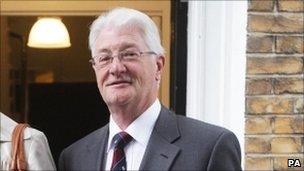Iran arms accused Christopher Tappin criticises US/UK treaty
- Published

Mr Tappin faces up to 35 years in jail if convicted in a US court
A retired businessman facing charges in the US over arms-dealing allegations is hoping a UK government review could help his fight against extradition.
Christopher Tappin, 64, of Orpington, south London, denies conspiring to sell parts for Iranian missiles.
The Kent County Golf Union president is awaiting extradition to the US but has said the current UK treaty with America is weighted in favour of the US.
A Home Office spokesman said the extradition laws were being reviewed.
'One-sided' system
He said the Home Office could not comment on individual cases but added that the outcome of the review would be known within weeks.
The US Embassy in London said evidentiary standards for the US and UK were "roughly equal".
Mr Tappin, who has put his house on the market to cover his legal costs in the US and the UK, said his hopes rested on the ongoing review.
He said: "I think that what we've been fighting for is to get the act reviewed. We don't think it's fit for purpose. We believe the system is one-sided.
"The Americans do not have the same dealing of the act. They don't deal with it the same way we do. We go by the letter of the law and unfortunately the law as it stands means that UK citizens have no rights."
He added: "To get American citizens extradited from America, you have to do a lot more than just point a finger. You have to produce a prima facie case with proper evidence, which the Americans do not have to do."
Mr Tappin, a former director of Surrey-based Brooklands International Freight Services, has said he believed he was exporting batteries for the car industry in the Netherlands.
He has also claimed the company selling the parts was a fake one set up by a US customs sting operation.
He said: "They wouldn't give us any information with regard to what the batteries were. Now they turn round and say they can only be used with missiles."
Human rights bid
Mr Tappin is awaiting a High Court appeal hearing in his legal fight against the extradition.
In June, the Home Office said it would not refuse his extradition on human rights grounds.
Mr Tappin is accused of conspiring to export defence articles without licence or approval and aiding and abetting the attempted export of defence articles without the required licence.
He is also accused of intentionally and unlawfully attempting to conduct financial transactions from the outside to a place inside the US, with the intent to promote the carrying on of a specified unlawful activity.
If convicted, he faces 35 years in prison.
A spokeswoman for the US Embassy said the terminology used differed slightly for each country, but the standard imposed by each country was the same as that met by both American and British police to arrest a suspect in domestic policing operations.
She added that the US did not require, and has never required, a "prima facie" showing before it will extradite persons to the UK.
- Published22 June 2011
- Published20 June 2011
- Published2 September 2010
- Published16 August 2010
- Published11 February 2011